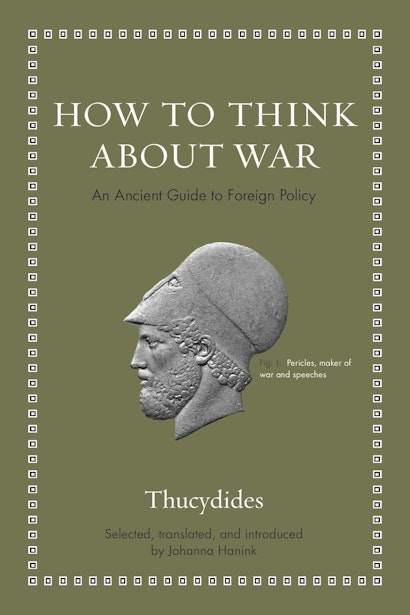Why do nations go to war? What are citizens willing to die for? What justifies foreign invasion? And does might always make right? For nearly 2,500 years, students, politicians, political thinkers, and military leaders have read the eloquent and shrewd speeches in Thucydides’s History of the Peloponnesian War for profound insights into military conflict, diplomacy, and the behavior of people and countries in times of crisis. How to Think about War presents the most influential and compelling of these speeches in an elegant new translation by classicist Johanna Hanink, accompanied by an enlightening introduction, informative headnotes, and the original Greek on facing pages. The result is an ideally accessible introduction to Thucydides’s long and challenging History.
Thucydides intended his account of the clash between classical Greece’s mightiest powers—Athens and Sparta—to be a “possession for all time.” Today, it remains a foundational work for the study not only of ancient history but also contemporary politics and international relations. How to Think about War features speeches that have earned the History its celebrated status—all of those delivered before the Athenian Assembly, as well as Pericles’s funeral oration and the notoriously ruthless “Melian Dialogue.” Organized by key debates, these complex speeches reveal the recklessness, cruelty, and realpolitik of Athenian warfighting and imperialism.
The first English-language collection of speeches from Thucydides in nearly half a century, How to Think about War takes readers straight to the heart of this timeless thinker.
Johanna Hanink is associate professor of classics at Brown University. Her books include The Classical Debt: Greek Antiquity in an Era of Austerity. She lives in Rhode Island. Twitter @johannahan
"How to Think About War will have a broad appeal to academics in the fields of classics, history, and political science, as well as to professional foreign policy analysts, political thinkers, and military strategists . . . . Hanink has produced a noteworthy resource that introduces the reader to the principal debates in warfare and foreign policy, both ancient and modern."—Nicholas D. Cross, Bryn Mawr Classical Review
"[In How to Think About War] we find shrewd observations on current events (in this case, the Peloponnesian War) matched with a taste for strategic prudence in dealing with adversaries. These insights illuminate some of the history that Santayana supposed we’re prone to repeat through ignorance."—Tracy Lee Simmons, City Journal
"[An] innovative translation. . . . With How to Think about War, students . . . see key speeches set chronologically and in contrast to one another, avoiding an entirely one-dimensional takeaway . . . Hanink’s translation provides a worthwhile addition to the ongoing dialogue inspired by Thucydides."—MAJ Kerney M. Perlik, US Army War College Quarterly
"[Hanink’s] vivid translations and thoughtful notes furnish a delightful entry point for one wishing to wrestle with some of the most studied, and still relevant, passages of Greek literature. [Her] rendition of Thucydides’ notoriously difficult prose is effective and will appeal to the Thucydidean neophyte."—Matthew Sears, Classical Review
“This slim, elegant book punches well above its weight, with striking, lucid translations of key speeches from Thucydides’s History of the Peloponnesian War. The artfully curated ancient texts within these pages speak with prescience and complexity to the precarious moment in which we now live. Johanna Hanink’s How to Think about War is essential reading for anyone who wishes to know how great military powers fall, democracies implode, and empires end.”—Bryan Doerries, author of The Theater of War: What Ancient Greek Tragedies Can Teach Us Today
“Hanink’s accessible translation and commentary cut an easy path through the dense Greek of the famous speeches in Thucydides’s History, avoiding the snare of reading them at face value. The result is a compelling illustration of the danger of using Thucydides to defend contemporary political decisions.”—Donna Zuckerberg, author of Not All Dead White Men: Classics and Misogyny in the Digital Age
“This invaluable collection presents the most vivid, thought-provoking, and important speeches from Thucydides’s work, which have inspired the analysis of politics, war, and international relations ever since. Johanna Hanink’s new translation makes them fully accessible to a modern audience, and her excellent notes both set them in their ancient context and draw out their significance for modern debates.”—Neville Morley, author of Classics: Why It Matters

